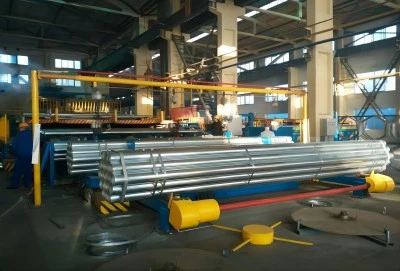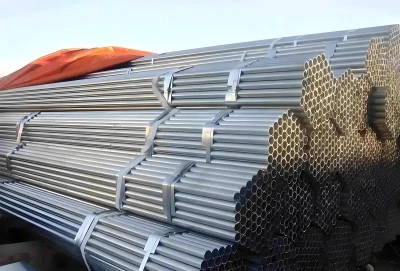Galvanized pipe, a popular choice in various industrial applications, is designed to resist corrosion. However, the question "Does galvanized pipe rust?" is not as straightforward as it might seem. While the zinc coating on pipes provides significant protection against rust, these pipes are not entirely immune to corrosion.
|
|
|
Zinc Coating vs. Rust Formation
How Galvanization Protects Against Corrosion
Galvanization is a process that applies a protective zinc coating to steel or iron, creating a barrier against corrosive elements. This zinc layer acts as a sacrificial anode, meaning it corrodes preferentially to protect the underlying metal. In essence, the zinc coating "sacrifices" itself to save the steel beneath.
The effectiveness of galvanization lies in zinc's electrochemical properties. When exposed to moisture and oxygen, zinc forms a stable layer of zinc carbonate on the surface. This patina further shields the metal from corrosive elements, enhancing the pipe's longevity.
Factors Affecting Zinc Coating Effectiveness
Several factors can impact the durability of the zinc coating on galvanized pipes:
- Environmental conditions: Exposure to acidic soil, salt water, or industrial pollutants can accelerate zinc corrosion.
- Coating thickness: Thicker zinc coatings generally provide longer-lasting protection.
- Temperature fluctuations: Extreme temperature changes can cause the zinc layer to crack or peel.
- Mechanical damage: Scratches or dents in the zinc coating can expose the underlying steel to corrosion.
Understanding these factors is crucial for project managers and engineers when selecting and installing galvanized pipes in various environments, from offshore platforms to industrial manufacturing facilities.
Comparing Galvanized Pipe to Other Corrosion-Resistant Options
While galvanized pipes offer excellent corrosion resistance, it's essential to compare them with other options:
- Stainless Steel: More corrosion-resistant but significantly more expensive.
- PVC: Immune to rust but less durable in high-temperature or high-pressure applications.
- Copper: Naturally resistant to corrosion but costly and susceptible to pinhole leaks.
For many industrial applications, galvanized pipes strike a balance between cost-effectiveness and corrosion resistance. However, the choice depends on specific project requirements, environmental conditions, and budget constraints.
Signs of Corrosion in Galvanized Pipes
Visual Indicators of Rust in Galvanized Piping SystemsDetecting early signs of rust in galvanized pipes is crucial for maintaining the integrity of industrial systems. Visual indicators include:
- Reddish-brown stains or spots on the pipe surface
- Bubbling or flaking of the zinc coating
- White, powdery deposits (zinc oxide) indicating the zinc coating is actively protecting the pipe
- Discoloration of water flowing through the pipes
Regular inspections by qualified personnel can help identify these signs early, preventing costly system failures.
Common Areas Where Galvanized Pipes Begin to Corrode
Certain areas of galvanized piping systems are more prone to corrosion:
- Joints and fittings where the protective coating may be thinner
- Areas exposed to constant moisture or high humidity
- Sections of pipe in contact with dissimilar metals (galvanic corrosion)
- Underground portions of the piping system, especially in acidic soils
Focusing maintenance efforts on these vulnerable areas can significantly extend the life of galvanized piping systems in industrial settings.
Testing Methods to Detect Early Stages of Rust Formation
Advanced testing methods can detect rust formation before it becomes visible:
- Ultrasonic thickness testing to measure pipe wall thickness
- Eddy current testing for surface and near-surface defects
- Radiographic testing for internal corrosion detection
- Electrochemical impedance spectroscopy for coating integrity assessment
Implementing these testing methods as part of a regular maintenance schedule can help prevent unexpected failures in critical systems, such as oil and gas transportation networks or water supply infrastructure.
Extending the Life of Your Pipes
Proper Maintenance Techniques for Galvanized Pipe SystemsMaintaining galvanized pipe systems is crucial for their longevity and performance. Effective maintenance strategies include:
- Regular inspections to identify early signs of corrosion
- Cleaning pipes to remove mineral deposits and debris
- Applying protective coatings to joints and fittings
- Controlling water chemistry in closed systems to minimize corrosion
- Implementing cathodic protection in underground or submerged applications
These practices can significantly extend the service life of galvanized pipes in demanding industrial environments.
Innovative Coatings to Enhance Corrosion Resistance
Advancements in coating technology offer new ways to enhance the corrosion resistance of galvanized pipes:
- Epoxy coatings for additional barrier protection
- Zinc-aluminum alloy coatings for improved durability in marine environments
- Nanotechnology-based coatings for superior corrosion resistance
- Self-healing coatings that can repair minor damage automatically
These innovative solutions can provide extended protection in challenging applications, such as offshore platforms or chemical processing plants.
When to Replace vs. Repair Rusting Galvanized Pipes
Deciding whether to repair or replace corroded galvanized pipes depends on several factors:
- Extent of corrosion damage
- Age of the piping system
- Criticality of the application
- Cost comparison between repair and replacement
- Future maintenance requirements
In some cases, localized repairs or re-coating may be sufficient. However, extensive corrosion or aging systems often warrant complete replacement to ensure long-term reliability and safety.
While galvanized pipes are designed to resist rust, they are not impervious to corrosion. The zinc coating provides excellent protection, but factors such as environmental conditions, installation quality, and maintenance practices play crucial roles in determining their longevity. For professionals in industries like oil and gas, water supply, and offshore construction, understanding the nuances of galvanized pipe corrosion is essential. By implementing proper maintenance techniques, utilizing advanced testing methods, and staying informed about innovative protective solutions, it's possible to significantly extend the life of galvanized piping systems.
Where to Buy Galvanized Pipes?
For high-quality pipes that meet the demanding needs of industrial applications, look no further than Hebei Longma Group. Our state-of-the-art production facilities, which include equipment imported from Germany and four independently developed production lines, ensure top-notch quality and consistency. With a professional team of over 300 employees, including 60+ technical experts, we bring unparalleled expertise to every project. Our comprehensive testing facilities, featuring ultrasonic automatic flaw detectors and industrial X-ray equipment, guarantee the integrity of every pipe we produce. We pride ourselves on fast delivery, with the ability to complete standard thickness steel pipes in as little as 7 days. Our products are backed by complete certifications, including API 5L, ISO 9001, ISO 14001, and more. Thanks to our long-term relationships with raw material suppliers and our integrated production model, we offer competitive pricing without compromising on quality. For all your galvanized pipe needs, contact us at info@longma-group.com.














